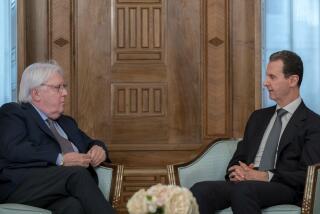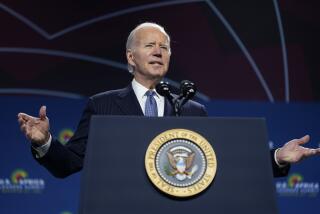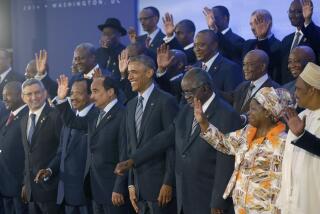Libyan Causes Uproar at Stormy League Summit in Algiers : Key Arab Chiefs ‘Lackeys of Imperialism,’ Kadafi Says
- Share via
ALGIERS — Libyan leader Moammar Kadafi caused an uproar at an Arab League summit meeting here Wednesday by telling a host of assembled kings, sheiks and presidents that many of them are “lackeys of imperialism” who ought to “go to hell.”
Kadafi was “on his most outrageous behavior,” one source at the closed-door meeting said. Arab League Secretary General Chedli Klibi conceded that the session had been “stormy.”
The three-day summit in a hilltop hotel in the Algerian capital overlooking the Mediterranean had been called to plan and coordinate Arab support for the intifada, the six-month-old Palestinian uprising in the Israeli-occupied West Bank and Gaza Strip.
Earlier, King Hussein of Jordan delivered a major speech in which he sharply criticized U.S. policy in the Middle East but also urged his fellow Arabs to show flexibility and moderation by not demanding the creation of an independent Palestinian state as a precondition to peace talks with Israel.
However, it was Kadafi, attending his first Arab summit in seven years, who stole the spotlight with a performance so extraordinary, even by his standards, that one conference observer afterward dubbed him “Colonel Quack.”
Kadafi, who boycotted the last three Arab summits, served notice before coming to this one that he planned to denounce unnamed Arab leaders whom he accused of “acting under the specific instructions of the U.S. State Department.”
No one took this very seriously, however, and thus the other 17 heads of state attending the summit apparently were taken aback by the extent of his outburst. However, Kadafi, one analyst suggested, may have been further angered by the fact that Saudi Arabia and other Arab states seemed to have succeeded in toning down the text of the resolution to be issued today at the conclusion of the summit.
Radical Arab states had wanted the summit to strongly reject the U.S. plan for Mideast peace currently being pursued by Secretary of State George P. Shultz, who ended another shuttle mission to the region Tuesday.
But conference sources said all specific references to the Shultz plan were likely to be dropped from the final communique, primarily at Saudi insistence.
“The Saudis argued that since nobody had accepted the Shultz plan, there was no need to reject them,” a Palestinian source said.
Whatever the reason, Kadafi appeared to be so annoyed with the proceedings that he delayed the start of a closed-door meeting Wednesday by refusing to enter the conference hall.
While the other leaders waited for him, Kadafi paced up and down a balcony at the hilltop Hotel Aurassi, conference sources said.
They said the colonel wore a white glove on his right hand so that, when he shook hands, he would not have to touch the other leaders.
Kadafi, in a written statement distributed by Libyan delegates, had already accused some of the leaders at the summit of being “lackeys of imperialism.”
But once inside, he delivered a verbal denunciation that drew shouts of protest from many of the other leaders, one source said.
“We must not beat around the bush,” Kadafi was quoted as saying. “The one and only enemy of the Arabs is the United States. We must all recognize this and anyone who refuses to do so, or who collaborates with America, can go to hell,” he said.
While King Hussein’s speech contained little that he has not said before, it was considered significant both as a candid, if constrained, appeal for moderation by Jordan’s fellow Arabs and as a reflection of its deep disillusionment with American peace efforts.
The king complained that U.S. policy toward the Middle East is biased toward Israel and devoted solely to “crisis management.”
The “outcome of Jordan’s experience with the United States over the past 21 years,” Hussein said, “is that the United States has no Middle East policy other than support for Israel.”
Saying that every American initiative in the region has followed a war or other major crisis--and ended as soon as the perceived threat has receded--Hussein suggested it was necessary for the intifada to continue, if only to keep the United States engaged in the search for a permanent peace.
While directed primarily against Israeli rule, the intifada has also tended to marginalize Jordan’s role in the peace process by undercutting Hussein’s attempts to cultivate an alternative, pro-Jordanian leadership on the West Bank to take the place of the Palestine Liberation Organization in any eventual peace talks with Israel.
Jordan now appears to have largely abandoned those efforts, and Hussein affirmed again that he accepts the PLO as the “sole legitimate representative of the Palestinian people” and would not seek to speak for the Palestinians at the U.N.-sponsored peace conference sought by the Arab states.
More to Read
Sign up for Essential California
The most important California stories and recommendations in your inbox every morning.
You may occasionally receive promotional content from the Los Angeles Times.









